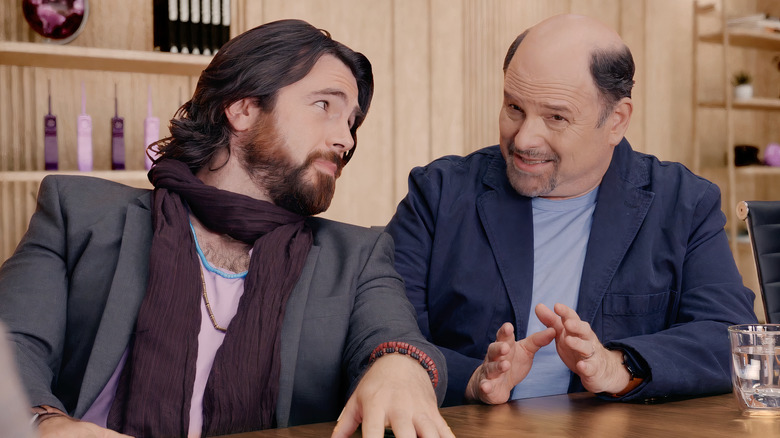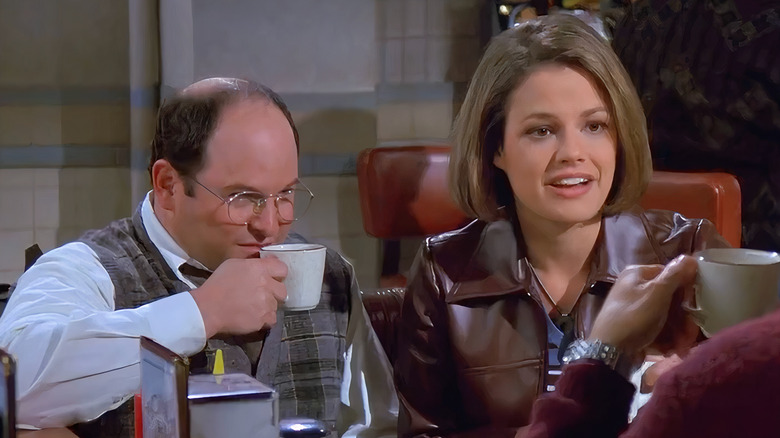Jason Alexander Rejects Seinfeld's George & The Yada Yada In Visible Commercial
George Costanza's side-splitting antics on "Seinfeld" entertained viewers for years. The iconic character is at the forefront of some of show's best episodes. One hilarious episode that still resonates with fans today, and apparently businesses as well, is Season 8, Episode 19 ("The Yada Yada"). The character's connection to the dismissive phrase is probably why the actor was recruited to let customers know Visible by Verizon won't be the ones to "yada yada" over the important details regarding a person's phone plan.
The mobile network recently released a commercial, "The Truth About Yadas," that indicates hidden fees, contracts, and overcharges are just some things the competition, dubbed "The Other Guys," would like to go under the radar. (In this case, the competition is obviously Metro by T-Mobile, who recently launched "Nada Yada Yada" campaign.)
Heavily alluding to the infamous "Seinfeld" episode, two smug executives attempt to convince Alexander with a manikin mockup resembling Costanza to shave his beard and help them "yada yada" away customer's annoying concerns. But the actor "yada yadas" his way into his own ad, highlighting Visible's upfront approach and making it clear he won't be shaving anything.
The promo not only helped get Visible's point across to people but also served as a fun opportunity for Alexander to show off his "yada yada" skills again and work with his real-life son Gabe Greenspan, who played one of the executives. But the advertisement didn't have everyone laughing and got the attention of one of the big competitors.
Metro has some yada yada to share with George Costanza
Metro by T-Mobile didn't think Visible by Verizon was accurate regarding what was said during "The Truth About Yadas" commercials. The company's competitor decided to pen an open letter voicing their concerns, but instead of sending it to Verizon, it was addressed to Jason Alexander. Before clearing any misconceptions, Metro welcomed the "Seinfeld" star to the wireless world, complimented his new beard, and thanked him for inadvertently spreading awareness for their Nada Yada Yada campaign.
After the pleasantries, the letter highlights what the ad neglected to mention about Metro, like how their full 5G network costs less, only needing one line to get the best price, and free 5G smartphones, which most other outlets don't offer. It also throws shade at Visible for being basically invisible by comparison due to Metro having more locations nationwide to visit. It concluded by inviting Alexander to stop by one of the many stores to chat further about wireless service.
It's clear Metro wants to do away with all this "yada yada" business and that the world would be a better place without it. But that may be easier said than done due to how popular the phrase became, thanks to "Seinfeld."
Seinfeld kept yada yada yada in the conversation
"Seinfeld" fans are probably aware that the phrase "yada yada yada" existed long before Season 8, Episode 19 ("The Yada Yada") premiered in 1997, but the show's hilarious use of the phrase can arguably be accredited to its long-standing popularity.
In the entry, George Costanza dates a very succinct woman named Marcy (Suzanne Cryer), who uses the phrase very often. At first, George loves talking to her, even adopting the phrase himself to avoid discussing his relationship with his parents and what happened to his fiancée, Susan Ross (Heidi Swedburg). But it all hilariously backfires on him when he finds out that Marcy used it to gloss over the fact that she slept with an ex-boyfriend and has a fondness for stealing. In the end, George wasn't a very big fan of "yada yada" anymore, but the viewers had a much different reaction.
After the episode aired, "yada yada" became one of the most quotable "Seinfeld" moments the show had ever released on par with the likes of "shrinkage" and "double-dipping." The fact that it is still widely used to this day is a testament to the overall impact the series had on its home audience, and if fans want to revisit the chapter that inspired Jason Alexander's Visible commercial, it is available on Netflix.

